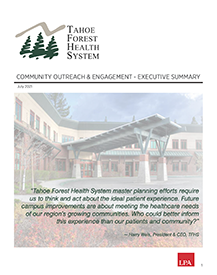Actress, producer, and advocate Fran Drescher launches a movement created to change the way policy makers and patients think about cancer and healthcare.
By Diana Price
When I speak with Fran Drescher, it’s 9 a.m. in Los Angeles and she has already been on two business calls that morning. She’s just finishing making her breakfast, and she apologizes for her hoarse voice, blaming a friend’s birthday party the night before. As she finishes making her oatmeal and we launch into a conversation about her public role as a cancer advocate and her own survivor story, I get the sense that a typical day in Fran’s life is defined by multitasking.
And yet, as she begins to speak about the recent launch of her own cancer advocacy organization, Cancer Schmancer, there is not a hint of distraction in her voice. She is passionate and articulate; determined to bring attention to what she sees as her mission, Fran is completely focused as she describes the background and the goals of the movement she has formed.
There is no doubt that the actress, producer, and advocate has brought passion to each of the projects that have defined her career. Perhaps most recognizable for her role as Miss Fine in the CBS series, “The Nanny,” which ran for six seasons and which she also created and executive produced, Fran’s acting career has also included starring roles in feature films, and her work has garnered two Emmy and two Golden Globe nominations.
However, it was in June of 2000 that Fran heard the news that would launch perhaps her most challenging and most life-altering role to date. After visiting eight doctors over two years, concerned about staining between periods, cramping, and other symptoms, Fran was finally offered a conclusive diagnosis: after a uterine biopsy, she was told she had Stage I uterine cancer.
Having endured the agonizing process of being repeatedly misdiagnosed and mistreated—she had been told she had a perimenopausal condition and was prescribed hormonal therapy, which exacerbated her symptoms and fueled the cancer—Fran was determined to help other women avoid a similar fate.
In fact, she wasn’t given any option but to go public with her story. “I was outed by the tabloids,” Fran says. “There was no recovering and keeping it under the rug and going back to normal. I had to develop a new normal.” In Fran’s case, her new normal included her decision to tell the story of her cancer experience in a way that would benefit other women, and she got to work writing a book, Cancer Schmancer, which was published in 2002.
And she was grateful for the platform she had to tell her story and provide information: “When you’re a celebrity and you’ve had a cancer I think it’s your obligation to lead a path in a blaze of glory,” Fran says. “I feel like I got famous; I got cancer; I lived to talk about it.”
Now, five years after Cancer Schmancer topped the New York Times bestseller list, Fran is using her passion for healthcare reform and women’s health, in particular, to create an advocacy movement—the Cancer Schmancer movement (www.cancerschmancer.org)—aimed at nothing less than revolutionary change.
“Like women before us fought for the right to vote, we must now fight for our rights as healthcare consumers,” Fran says. Using her celebrity and inspired by her experience as a survivor, Fran is determined to usher in a new age of accountability on the part of healthcare providers and to educate women about their health, their rights as patients, and their responsibilities to themselves and future generations.
And, Fran says, the Cancer Schmancer movement reaches beyond women’s gynecologic cancers: “it’s not just a woman’s issue, it’s a human issue.” Because, she says, it’s not just the woman who is affected when she receives a cancer diagnosis, it’s the entire family and the wider community: the child in the next generation, who watches a mother suffer and who inherits her attitude toward healthcare and patients’ rights is also impacted by the experience, creating a multi-generational cycle.
And it’s time for a change. It’s time, as the Cancer Schmancer logo says, for women to take control of their bodies, and for the healthcare industry and Capitol Hill to lead the way in needed reforms.
The revolution begins, Fran says, when patients—and women in particular—are transformed from patients to healthcare consumers. “The very word patient,” she says, “implies passivity.” And there’s no room for passivity when a cancer diagnosis comes to call. “No more. Forget it,” Fran challenges. “You are like a soldier on the frontlines, there’s no room for that. You have to be proactive, or you’re going to die.”
“It breaks my heart to hear of someone dying of uterine cancer,” Fran says, referring to her own cancer. “It’s a slow-growing, non-invasive cancer.” And yet, she continues, “the mortality rate is on the rise because women ignore and doctors misdiagnose.” It’s this pattern, in which women aren’t educated about the most important aspects of their own health and providers aren’t always responsive to the signs and symptoms that their patients present with, that must be changed.
“Most women’s cancers at the earliest stages mimic far more benign conditions,” Fran says, describing the difficulty of the situation, but it is at this earliest stage (Stage I) that cancers are most curable. For that reason, one of the central goals of her Cancer Schmancer movement is to ensure that all women’s cancers are diagnosed at Stage I.
Fran knows that her early-stage diagnosis was a major factor in her own successful treatment and recovery. Following the two years that she spent searching for an accurate diagnosis—which included one doctor telling her she was too young for cancer—Fran underwent a radical hysterectomy and has now been cancer free for seven years.
But she’s well aware that not all women are so lucky, and it is her conviction that there must be a change to the way women are educated about, and delivered, their healthcare that drives her work today.
Fran’s passion fuels her hands-on work with Cancer Schmancer. Even as we talk, she is planning another trip to Washington, D.C. to meet with lawmakers to discuss the implementation of Johanna’s Law, the landmark legislation passed in January 2007 that authorizes development of a national gynecologic cancer awareness campaign to educate American women and health professionals about the signs and symptoms of ovarian and other gynecologic cancers.
Fran was instrumental in lobbying for the passage of the legislation, receiving special thanks in the Congressional Record for her lobbying efforts.
Since that time, she has continued to spend time on Capitol Hill, rallying politicians on behalf of awareness, education, and funding for women’s healthcare, and—since the June launch of the Cancer Schmancer movement—speaking with the voice of the thousands of the movement’s members who similarly support reform and education.
It’s exciting, Fran says, to see the organization begin to take shape, as she continues to educate her fans and friends about what the Cancer Schmancer movement is all about: “We need to educate people to realize that this is a grass-roots movement and the dollars that they give us are going to make a difference on Capitol Hill,” Fran says. “What needs to happen now is real change; all roads lead to Rome, and Rome is Capitol Hill.”
In fact, it appears that Fran’s journey will soon lead her on many roads far from the nation’s capital: her efforts in Washington have been so successful that she was recently awarded the distinguished position of Special Envoy for Women’s Gynecologic Health Issues by the U.S. State Department to speak globally to women in Middle Eastern, Eastern European, third world, and emerging nations on prevention and education of women’s cancers.
“Knowledge is power,” Fran says, describing her enthusiasm for her new position. “I’m just going to speak to everyone and go everywhere and spread the word that women have to take control of their bodies and transform themselves from being patients to become medical consumers.”
But Fran is also quick to point out that as honored as she is with her new position as a global envoy, there remain plenty of women in her own neighborhood who need information about women’s health issues, and she remains committed to supporting women wherever she meets them.
Describing a recent encounter at a conference in Los Angeles with a woman undergoing treatment for Stage IV ovarian cancer, Fran’s voice fills with the emotion that so obviously keeps her working tirelessly on behalf of survivors:
“The look on her mother’s face was to know everything,” Fran says of the meeting with the 42-year-old woman and her mother. “I encouraged her to be proactive, to be strong. I told her to try everything, and that ‘You are the general; this is your temple. Go to battle and win the war.’ Her face is still ingrained in my mind. It still inspires me.”
Continually inspired by the survivors who share their stories as well as by her own experience, Fran is devoted to galvanizing the members of Cancer Schmancer—and the general public—to make the changes that will make a difference. Her efforts to do so, she says, now take up a good portion of the time that in the past was also devoted to her creative projects:
“I’m trying to fit in my writing,” she says, speaking of the balance she tries to achieve in maintaining both her career and her advocacy role. “But I do turn down work; unless it’s really great I can’t take myself away from [Cancer Schmancer]. I’m the president and visionary.” Still, she says, she will always continue to act. “I have to always act for two reasons: because I am an actress and because the more high profile I am the better it is for the movement.”
Though Fran has considered further sitcom roles and has also thought about hosting a talk show, neither, she says, seem to be the right choice now when compared to the work she’s doing with Cancer Schmancer. Nor has the role of elected official enticed her yet, although she has considered that option.
“I was asked if I want to run for congress in 2008, but 2008 is too early—I need to get the movement on really solid legs; I want to do my work as special envoy. That opportunity isn’t going anywhere.” She came to that final decision she says, after attending a special gathering hosted by wellness guru Deepak Chopra in New Mexico earlier this year.
“I realized that’s not my voice right now. If I have to deal with all the special interests of my district I’m not going to be able to move women’s health reform in all the ways we need it to move right now.”
So for now, Fran will continue to focus on Cancer Schmancer: revolutionizing healthcare and transforming the way patients think about their treatment. “It’s about education, prevention, and policy change,” Fran says. “The jig is up, and the buck stops at CancerSchmancer.org.”
Copyright © 2019 CancerConnect. All Rights Reserved.



